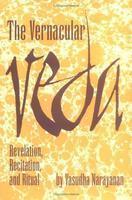
Book Summary
The vernacular Veda explores the centrality of a tenth-century Tamil poem, the Tiruvaymoti (TVM), to the daily worship of south India's Hindu Srivaisnava community. A work of extraordinary significance in Hindu Literature, the TVM was the first common language text to be included in domestic and temple liturgy, and it continues to be enacted in worship services today. In addition, parts of the TVM are sung on Indian radio stations, performed on television, and recorded for mass distribution. Vasudha Narayanan's comprehensive study profiles the author of the Veda and reveals the Srivaisnava community's passionate involvement with the TVM and the impact this single poem has had on the lives of community members for more than one thousand years. Narayanan researched the TVM's role in Hindu society by interviewing temple servants and by attending temple performance throughout south India. From these observations she draws conclusions about the pride the Srivaisnava community places in the accessibility of the TVM; unlike the Sanskrit Vedas, it can be recited by both males and females of all social stations. Narayanan identifies the Hindu cultural norms collectively challenged by the TVN' and she highlights the ways in which the TVM differs from other texts included in the Tamil devotional canon. In the final section of the book, Narayanan translates 143 of the TVM's most widely recited verses, marking the Temple TVM's first publication in English.
Book Details
| Book Name | The Vernacular Veda: Revelation, Recitations, And Ritual |
| Author | Vasudha Narayanan |
| Publisher | University Of South Carolina Press (Jun 1994) |
| ISBN | 9780872499652 |
| Pages | 265 |
| Language | English |
| Price | 2524 |








